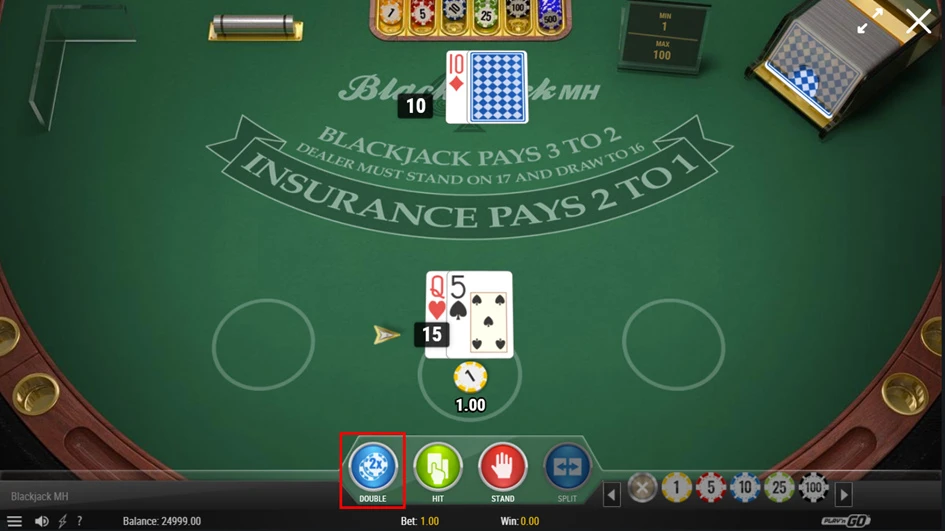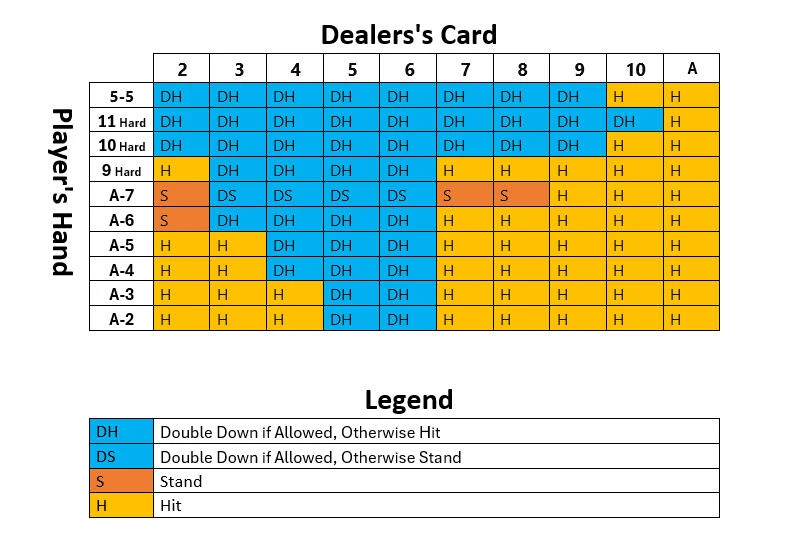
When to Double Down in Blackjack ?

What is a double down in Blackjack?
Double down in blackjack is a strategic move that allows a player to double their initial bet after receiving their first two cards. This also comes with the stipulation that the player will receive only one additional card. This option is typically exercised when the player believes that a single card will put them in a position to beat the dealer's hand. The double-down decision is made by placing an additional bet equal to the original bet. Following this, the dealer deals one more card to the player, completing their hand. This move is often used in situations where the player's first two cards total 9, 10, or 11, offering a favourable chance of achieving a strong hand with the next card drawn.
How does blackjack double down work?
Understanding the basic rules of doubling down in blackjack is crucial for making informed decisions. Here are the fundamental guidelines to follow:
The basic rules
- Eligibility: Players can only double down after receiving their first two cards.
- Bet Size: The additional bet must be equal to the player's original bet.
- One Card Rule: After doubling down, the player receives only one additional card, regardless of its value.
- Timing: The decision to double down must be made immediately after the initial two cards are dealt.
- Hand Totals: Some casinos may restrict doubling down to certain hand totals, typically 9, 10, or 11.
- Game Variations: Rules regarding doubling down can vary by casino and specific game version - always check the house rules.
- Dealer's Hand: The dealer continues to play their hand according to standard blackjack rules after the player has doubled down.
Advanced rules
- How to indicate a double down to the dealer in an online game? In an online blackjack game, players typically indicate a double down by hitting the "Double Down" button provided in the game's interface.
- Can you double down after hitting? No, you cannot double down after hitting. The double-down option is only available immediately after the initial two cards are dealt.
- Can you double down on 21 in blackjack? No, you cannot double down on 21. If the first two cards total 21, you have blackjack, and the hand is considered a winning hand, making doubling down unnecessary.
- Is it possible to double down after a split? Yes, it is possible to double down after a split in many blackjack variations. However, this rule can vary by casino, so it is important to check the house rules of the game.
When to double or not?
Knowing when to double down or avoid when to double down is crucial for maximizing your chances and minimizing risks. Here are the key situations to consider:
When to double down?
Doubling down in blackjack is generally considered a good strategy in the following situations:
- Player's Total is 11: When your initial two cards total 11, you have a high probability of reaching 21 with one additional card.
- Player's Total is 10 Hard: When your two cards total 10 hard (without an Ace card), doubling down can be advantageous if the dealer shows a lower card value (2 through 6) that might result in a weak hand. It's generally a good option, even if the dealer's card is higher. And if you have a pair of 5s, you should avoid splitting and instead double down.
- Player's Total is 9 Hard: When your cards total 9, doubling down can be beneficial if the dealer's face-up card is between 3 and 6.
- Soft 16-18 (Ace + 5, 6, or 7): Doubling down on a soft hand (a hand that includes an Ace counted as 11) can be a good strategy if the dealer's upcard is weak, usually 3, 4, 5, or 6.
These situations take advantage of the statistical likelihood of improving your hand with one additional card while the dealer is in a potentially weak position.
When to not double down?
There are several situations in blackjack where it is generally advisable not to double down:
- Player's Total is 12 or Higher: Doubling down on a total of 12 or higher increases the risk of busting with one additional card.
- Dealer's Strong Upcard: Avoid doubling down if the dealer's face-up card is a 7, 8, 9, 10, or Ace, as these cards increase the likelihood of the dealer having a strong hand. If you have a hard 10 or an 11, you can try the double down even with a strong card from the dealer. But in other cases, it’s best to avoid it.
- Soft Hands Not Between 16-18: Doubling down on a soft hand that does not total between 16 and 18 can be risky unless you know the dealer’s upcard and the specific game rules. If the dealer’s card is 4 (only for A-4), 5 or 6 this can be attempted, otherwise avoid it.
- Low Total Hands (Below 9): When your initial two cards total less than 9, the potential for significant improvement with one card is low, making doubling down less advisable. If the dealer's card is 5 or 6, this can be attempted, otherwise avoid.
- After Splitting in Some Variations: While some variations of blackjack allow doubling down after splitting, many do not. Always check the house rules before making this move.
- Unfamiliar or Unfavorable House Rules: If the game variation has unfavourable rules for doubling down, such as restrictions on which hands can double down, it’s best to avoid this strategy.
These guidelines help minimize the risk of losing more money in unfavourable situations.
Blackjack Double Down Chart
To provide a clear and concise reference, the following chart summarizes the hands for which you should consider doubling down and those where you should avoid it :

Examples of game sequences with a double down :
Example 1: Double down Bet is Won
Here's an example of a game sequence where the double-down is used and ends with the player winning:
- Initial Deal: The player is dealt a 6 and a 5, totaling 11. The dealer's face-up card is a 4.
- Decision to Double Down: Seeing the total of 11 and the dealer's weak card, the player decides to double down. They place an additional bet equal to their original wager.
- One Additional Card: The dealer deals one additional card to the player, which is a 9. This brings the player's total to 20.
- Dealer's Turn: The dealer reveals their face-down card, which is a 10, giving them a total of 14. The dealer draws another card and gets an 8, making their total 22.
- Player Wins: With a total of 20, and the dealer having exceeded the limit of 21, the player wins, having successfully doubled their initial bet.
Example 2: Double down Bet is Lost
Here's an example of a game sequence where the double-down is used and ends with the player losing:
- Initial Deal: The player is dealt an 8 and a 3, totaling 11. The dealer's face-up card is a 6.
- Decision to Double Down: Seeing the total of 11 and the dealer's weak card, the player decides to double down. They place an additional bet equal to their original wager.
- One Additional Card: The dealer deals one additional card to the player, which is a 2. This brings the player's total to 13.
- Dealer's Turn: The dealer reveals their face-down card, which is a 7, giving them a total of 13. The dealer draws another card and gets an 8, making their total 21.
- Dealer Wins: With the dealer's total at 21 and the player's total at 13, the dealer wins the hand, and the player loses both their original and doubled bets.
What are the limits of blackjack double down?
Is This an Interesting Move?
Doubling down can be an interesting and potentially profitable move in blackjack. It allows players to capitalize on favourable situations where the probability of winning is higher. By doubling their bet when the odds are in their favour, players can maximize their potential. However, it also carries a higher risk, as it involves committing additional money based on the outcome of a single card draw. This move is most interesting when used intelligently and with a good understanding of the game’s probabilities.
Is It Suitable for Beginner Players?
For beginners, doubling down can be a challenge. While it offers the opportunity to increase winnings, it also requires a solid grasp of when to use it effectively. Beginners might struggle with making the correct decisions and could potentially lose more if they double down in unfavourable situations. It is advisable for novice players to first focus on understanding the basic rules and strategies of blackjack before incorporating more advanced moves into their gameplay.
Is It Recommended Only for Expert Players?
Doubling down is often recommended for expert players who have a deep understanding of the blackjack strategy and probabilities. Experienced players are better equipped to evaluate when doubling down is advantageous, based on their hand and the dealer’s upcard. They can make informed decisions that increase their chances of winning while minimizing risks. Experts can also adjust their strategy based on specific game variations and house rules, making the double-down move a powerful tool in their arsenal. Therefore, while not exclusively for experts, it is most effectively used by those with significant experience and knowledge.
Advantages and disadvantages of doubling down
|
Advantages
|
Disadvantages
|
|---|---|
|
Maximizes Potential Winnings |
Higher Risk |
|
Allows players to increase their bet in favorable situations, potentially doubling their profits.
|
Involves committing additional money based on the outcome of a single card draw, which can lead to larger losses.
|
|
Takes Advantage of Favorable Odds |
Requires Strategic Knowledge |
|
Utilizes statistical probabilities to capitalize on strong hands.
|
Needs a good understanding of blackjack strategy and probabilities, which can be challenging for beginners.
|
|
Can Put Pressure on the Dealer |
Not Always Allowed After a Split |
|
By doubling down, players can force the dealer to react to higher bets.
|
Some casinos or game variations do not allow doubling down after splitting pairs, limiting its use.
|
|
Enhances Strategic Play |
Vulnerable to Bad Draws |
|
Adds depth to gameplay by providing an additional strategic option.
|
The strategy can backfire if the player draws a low-value card, resulting in a weak hand and a higher loss.
|
Our opinion on the double-down bet in Blackjack:
Doubling down in blackjack is a powerful strategic move that can significantly enhance your betting experience and boost your winnings when used correctly. While this move offers exciting opportunities, it also comes with increased risks, making it more suitable for players who have a better grasp of basic strategy. Beginners should approach the move cautiously, focusing on mastering the fundamentals of the table game.
By practising and learning from experience, you can effectively incorporate doubling down into your blackjack strategy, turning it into a valuable tool for success.

Author
Content Writer
